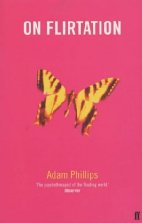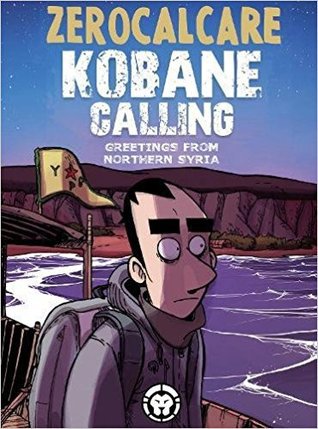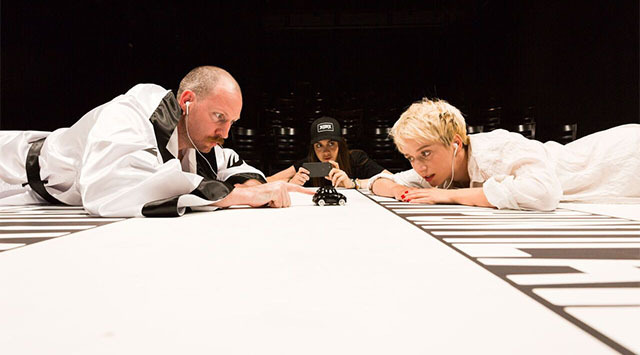
Read 08/02/2017-13/02/2017
Rating: 2 stars
I’ve had Adam Phillips’ book, On Flirtation, on my bookshelf for more than ten years. I bought it on the recommendation of someone highly inappropriate with whom I was flirting, at a time when someone else was flirting with me and I was flirting with the idea of being a more hedonistic person than had previously been the case.
I enjoy flirting. I like that feeling of uncertainty, the thrill of what might happen, whether it’s stepping too close to the edge of something safely dangerous, or making eyes at someone attractively unattainable. I like the sense that I could become someone different by flirting with possibility, but not having to commit to it. I also like that it ends as soon as it becomes boring, or as soon as something more important takes up your attention.
I started reading On Flirtation for The Reader’s Room Winter Challenge. I was looking forward to it. I expected it to be a book about what flirtation is, why we do it, what its hidden meaning and purpose might be. The opening sentences of the first two paragraphs confirmed what I think about flirting.
The fact that people tend to flirt only with serious things – madness, disaster, other people – and the fact that flirting is a pleasure, makes it a relationship, a way of doing things, worth considering.
Exploiting the ambiguity of promises – the difference, say, between someone being promising and someone making a promise – flirtation has always been the saboteur of a cherished vocabulary of commitment.
Sadly, it didn’t turn out to be a treatise on flirtation. It was more of an exploration of and challenge to psychoanalytic dogma. Not the book I wanted at all. I’d go as far as saying the blurb on the back cover was misleading.
Adam Phillips uses the idea of flirtation to explore the virtues of being uncommitted – to people, to ideas, to methods – and the pleasures of uncertainty.
It didn’t help, either, that Phillips’s writing style kept getting in the way of my reading. There were too many asides. Asides between commas, asides within parentheses, asides set apart by dashes. Sometimes multiple asides within a single sentence. It didn’t help that my concentration was fucked because of a significant change in my personal life coinciding with an attack of the norovirus. All said, it took two days to read the introduction. I nearly gave up.
The book is a collection of essays previously published elsewhere. The first part, The Uses of the Past, pulls together lectures and papers on different aspects of psychoanalysis, and was a really irritating beginning for me.
As I started to read the first essay, I recognised instantly why the man I was flirting with a decade ago had recommended it to me. The first client that Phillips discusses has a similar issue to the one I had at the time. I’m a different person now. Other things have happened to me that have freed me from the issue. I was vaguely interested in what Phillips was saying, but also vaguely bored by the navel gazing of it. My head wasn’t in the right place. Or maybe I instinctively agreed with Phillips in that first essay that life is pretty much a series of accidents that we deal with in order to move on. We accumulate experience from these dealings, but no two things are ever the same. Each event is new, each emotion we feel about it, each decision we make about it.
As is probably apparent from the nature of my book reviews, I am interested in what makes me tick and why the experiences I have make me behave in certain ways. I think that literature can be a tool to help us understand ourselves better, by finding echos of our own lives in the fictional lives found in novels. As a consequence of my self-absorption, I am interested in psychology, in what makes people in general tick and how experience influences behaviour in community. I know very little about psychotherapy and psychoanalysis, or their relationship to psychology, but I think there is value in psychotherapy in helping people who are struggling with life and who want to move on to a different way of being. There’s a passage that sums this up in the essay that reviews Julia Kristeva’s treatment of depression:
People organise their lives to avoid the imagined catastrophe of certain conversations; and they come to analysis, however fluent they may be, because they are unable to speak. But some people, of course, have had unspeakable experiences, or experiences that have been made unspeakable by the absence of a listener.
Although I’m not saying I think psychotherapy is pointless, I do think that sometimes, if you’re not dealing with trauma, too much time spent inside your own head can be paralysing. Sometimes I think you have to accept that thinking about the why is self-indulgent, and it’s more important to get on with living. Reading this book brought out more of that for me.
Something that interested me throughout was Phillips’s apparent challenge to the rigidity of Freudianism, which normalises everything, leaving no window for chance. Instead of things sometimes happening by accident, they become alternative paths already laid down that life sends us along. I haven’t read any Freud, so I can’t comment, but I did find Phillips’s opinion interesting. I also enjoyed Phillips’s perspective on psychoanalysis as a relatively young discipline, not even a century old when the book was compiled, and barely that age as I read it. He is able to assess the inconsistencies and vaguenesses from the inside, as a practitioner, and to view the conflicts that occurred at the birth of the movement at a remove.
There’s an essay that considers remembering as a means of forgetting and vice versa. It went over the same ground from many different angles and made me feel a little bit scathing towards psychoanalysts and their chewing over things that don’t really matter, instead of getting on with the business of living. Perhaps because of my frame of mind while reading, which was one of frustration with how slowly the wheels of bureaucracy were turning in dealing with the matter of my mum’s death, I felt irritated by the wankery I was reading. I got what he was saying, that sometimes remembering something in a particular way displaces a more painful or unpleasant reality and helps us to forget, but I couldn’t be bothered ruminating on why that might be.
I briefly felt pity for Phillips and others of his profession, as it seems to me that psychoanalysts spend a lot of time hovering on the surface of life, observing it and analysing it, instead of being immersed in its chaos. I wonder whether they ever truly experience anything. I wonder whether it’s a way of avoiding having to have experiences. Do they have relationships like the rest of us? Do they know the joyous abandon of laughing until your stomach hurts with a person you feel completely relaxed with? Do they know the comfort of abandoning yourself to grief in the arms of someone who doesn’t care that you’re a mess? Or are they too busy gathering data on how they’re feeling and how the other person is reacting? I once went to a party with a bunch of psychology students. It was unlike any party I’d been to. There was a weird air of judgement and forced fun as they gathered into groups and tried to psych each other out.
I enjoyed the essay that looks at how success, the achievement of a wish, can cause crisis. I found it more interesting because it started with a biographical sketch of John Stuart Mill and considered the nature of his mental breakdown when he was 19. It then went on to examine the nature of ambition, and gave some clear exposition on Freud’s theory of id, super ego and ego. It was timely for me because I’m struggling with the realisation of a long held wish – that my mum would die and release us all from the prison of dementia. My id created the wish – that my mum would die; my super ego brought my ethical standards into play – it’s wrong to want your mum to die; my ego tried to rationalise it so I could function – she was no longer the woman she used to be, she wanted us to get on with our lives, she didn’t want to be dependent. Now that the reality is here, it’s not what I was expecting. Of course, my brother, sister and I are still in limbo caused by bureaucracy and the different agencies we have to interact with taking their time to make decisions, so we can’t do the important thing of arranging the funeral. That doesn’t help. I’m not in crisis, but I would like to feel something different to numb. It was useful to read Phillips’s words on the either/or of id versus super ego actually being fine as an and. I can for good reason have wished my mum to die and I can for equally good reason have felt uncomfortable about that. I can continue feeling both things now that she is dead. It just means I’m human.
Even without the skew of my personal reaction to it, the fourth essay was well written and one of the more focused passages in the book. I think because of the audience it was originally aimed at: students at university who might be struggling with their new way of life and changes to their ambitions. I went to university to study accounting, a decision strongly influenced by the school I attended who wanted me to have a career in mind that reflected well on its reputation. I hated accounting and was in crisis for the whole first term, sobbing on a weekly basis in the office of my personal tutor while he told me I seemed to be settling in very well, until I spoke to a different lecturer who told me it was okay to change my mind, I wasn’t letting anyone down, and I would be much happier studying something I was interested in, regardless of job opportunities. I’m still grateful to him for talking sensibly to me, adult to adult, despite me being a very young 19 at the time. It’s something that has stayed with me. If you’re not happy, you are allowed to change direction.
So I did get something from the book.
As I worked my way through, though, I decided it might have made better reading if I’d dipped in and out of it. The essay comparing psychoanalysis with autobiography also made me wish that Phillips had had some kind of writing or editing training. Something that would provide him with the understanding that less is often more, and that going over the same point from multiple angles, while padding out the word count, often doesn’t add to clarity or readability. I also recognised that the parts of the book I enjoyed more were the parts that were more akin to biography than analysis, including the sections where Phillips provides a biography of psychoanalysis, as in the essays contained in section two, Psychoanalysis Reviewed. Phillips challenges a lot of what is the accepted view of psychoanalysis, and highlights the contradictions present in the various theories held by different practitioners. He also calls members of his profession out on their arrogance in relation to other methods of understanding the human condition.
In a roundabout way, in a review of a then new edition of the correspondence between Freud and his translator and part time PR man, Ernest Jones, Phillips attempts to address the sexism inherent in early psychoanalysis, with its objectification of women as a curiosity to be resolved scientifically. Phillips seems to miss that the root of the issue is the enduring belief held by men that they are superior to and therefore more important than women. He says he’s baffled as to why men like Freud and Jones behaved this way, apparently lacking any real psychoanalytical motivation for treating women as objects of scientific enquiry. Phillips reduces it to personal need in each man. Bless him.
Psychoanalysis had to invent certain kinds of women to legitimate its practices. But every picture of a woman, like every picture of a man, is, among other things, the solution to a (largely unconscious) problem … Freud needed a picture of a woman who wanted to be a man, because he needed to believe he was something someone else (or other) would want to be. Jones needed a picture of a woman who wanted to be a woman, so that he wouldn’t have to do it for her. It is part of their legacy that we are bewitched by descriptions of sexual difference either in terms of insufficiency and lack – the sexes representing to each other what is rightfully theirs, and the (often violent) consequences of that – or in terms of an (allegedly) essential femininity, which brings with it a different kind of violence, the violence of normative standards and obligations to conform.
Jones in particular comes across as a misogynistic little shit in all of this, sending women to Freud for correction when he found them unmanageable. Phillips, of course, psychoanalyses this, trying to understand what motivated Jones in his misogyny. I didn’t have time for that, which is one of many reasons I’m not a psychotherapist.
The third and final section, Writing Outside, is another mix of book reviews, a magazine piece and a lecture. I most enjoyed the review of Philip Roth’s book about the illness and death of his father, because it echoed what I said above about literature being a tool to help us understand ourselves better, and because the things Roth had to deal with, in becoming a mother to his father, were similar to the things I went through with my mum. Phillips also introduced Roth to me as a person in a way that has made me keener to read some of Roth’s work.
Although there were moments throughout that engaged my interest, I found the book pretty dry overall. At times it’s the book equivalent of being trapped in a conversation with someone who thinks they’re riveting but who lacks the social skills to recognise the glazed eyes of boredom in their listener.
My conclusion from reading On Flirtation is that I didn’t read it in the best frame of mind, and that I lacked the broader knowledge of psychoanalysis and its history, including who beyond Freud has been key in its development as a discipline, that I needed in order to fully appreciate what Phillips was saying about his profession.
It also confirmed for me that the man who recommended the book to me was a self-absorbed wanker. I might take the memory of him down to the charity shop when I give the book away.
Psychoanalyse that.
Advertisements Share this:




